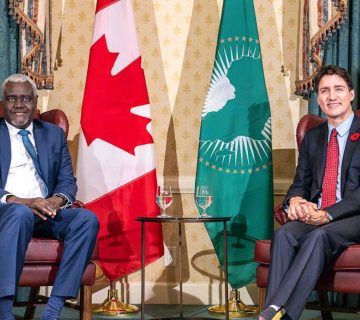It may at first seem paradoxical that extending rather than easing restrictions can hasten Kenya’s reopening, and reduce the incidence of another wave of Coronavirus infections. Yet, during his much-awaited June 6, 2020 COVID-19 address that simultaneously constrained and liberated citizens, President Uhuru Kenyatta said it without saying it: reducing COVID-19 cases; increasing patient-bed capacity; and improving surveillance and contact tracing will help build Kenya’s resilience against the ‘global pandemic.’ The President should have also thrown in a line or two for the ten-household architecture (nyumba kumi) through which the idea of public good can be leveraged, and this three-point action plan embedded. This is because it will also take a citizens-government action to effectively fight the current pandemic.
But he did not. This seeming ‘omission’ yields two possible readings. First, the double-edged nyumba kumi initiative has a community policing gene. The President undoubtedly appreciates the gravity of the hot potato issues of selective enforcement and police brutality that are dominating political discourses nationally and globally. He also understands the challenges of policing citizen behavior in the COVID-19 environment. Kenyans – including the ones who break the law and/or contravene public health guidelines – expect security officers such as the ones enforcing nighttime curfew and partial lockdowns to protect them and provide sanitizers and face masks. However, security officers are mandated to maintain law and order, and enforce government directives. The role of distributing hand sanitizers and face masks lies primarily with other stakeholders such as elected officials, business owners, and the health ministry. The inability of some security officers to understand emerging complexities and expectations has reignited the rights-responsibilities debate and placed them on a collision course with some citizens and pro-rights activists.
‘Seeing’ Coronavirus
The second reading could be that Kenyatta, who is alive to Kenya’s continuing struggle with ignorance, disease, and poverty, is confident that when push comes to shove, Kenyans will assume responsibility for themselves; their kin and friends; and their country. They will find ways to cope; they will seek knowledge, adapt their behavior, and innovate. At the moment, some individuals in parts of the country are still disregarding social distancing, wearing face masks, and personal hygiene. Some – for whom seeing is believing – have adopted a cavalier attitude toward the disease because they have not yet ‘seen Coronavirus’ or ‘Corona deaths ‘in their front porches or backyards. In fairness, even as the rarity versus commonality of asymptomatic transmission debate continues to divide expert opinion globally, Kenya’s health ministry has said that most of the people who have contracted COVID-19 in Kenya do not show its symptoms. 88 per cent of Kenya’s June 8, 2020 caseload, for example, were asymptomatic. Others are ignorant about the disease, efforts of the government and other stakeholders such as the World Health Organization to publicize COVID-19 notwithstanding. The third group cannot afford personal protective implements such as sanitizers (including handwashing soap and safe water) and face masks. United Nation’s lead development agency, UNDP, categorizes Kenya as a medium development nation where: the number of hospital beds available for every 10,000 people is wanting; access to safe water and basic sanitation is limited; and a sizeable population is involved in unpaid family work.
Brother’s Keeper
Contrary to many expectations, President Kenyatta reduced curfew hours by 180 minutes, and extended curfew and partial lockdown of Nairobi, Mombasa, and Mandera Counties by 30 days. Kenyans quickly assumed their places in two camps: the side opposed to further COVID-19 restrictions that argues that this will hurt the economy more, and the one that supports the restrictions which they view as prerequisites for reducing the number of infections and speeding post-COVID-19 recovery. The more important task here is to find a manageable, flexible medium that realizes the president’s health-focused action plan while addressing economic, security, and other concerns meaningfully. Nyumba kumi appeals because it is community-focused.
Kenyans can explore and exploit this framework actively to help rein in pro-COVID behavior, and help president Kenyatta actualize his three-point anti-COVID-19 action plan. Working with local administrators such as nyumba kumi leaders, security officers, and health officials, Kenyans can form COVID-19 accountability groups to achieve several goals. Members can help to ensure all individuals in a given locality observe measures to prevent Coronavirus infection by distributing personal protective kits; identifying, providing for, and shielding the most vulnerable members; and calling out members whose behavior – not wearing face masks in public areas such as mama mboga stalls, eateries, bus stops, and kiosks, or wearing the masks incorrectly, for example – endangers that of others.
Additionally, members can identify or create appropriate facilities for home-based care if cases increase beyond local health centers’ capacity. These could be town halls, community centers, and unoccupied homes of residents or local investors. Nyumba kumi leaders should actively engage members of their communities, preferably through non-contact platforms such as social media and local radios. This engagement should be participatory, representative, and reinforce government efforts. These leaders can then present their localities’ capabilities and vulnerabilities to actors such as the National Emergency Response Committee on Coronavirus; ministries of health and interior and national government, and health and security committees in counties to improve anti-COVID-19 interventions at national and county levels. This bottom-up approach to managing Coronavirus will enhance ownership, and help Kenya overcome the disease faster and more sustainably. In the post-COVID-19 period, the approach can be leveraged to manage other public health issues. All the while, Kenyans should be mindful of the propensity for nepotism, tribalism, and corruption, and heed the President’s call to place people before profit.
Roselyne Omondi is the Associate Director, Research, at the HORN Institute.
Photo: COVID-19 mass testing exercise in Nairobi (Photo Credit: Citizen TV)



